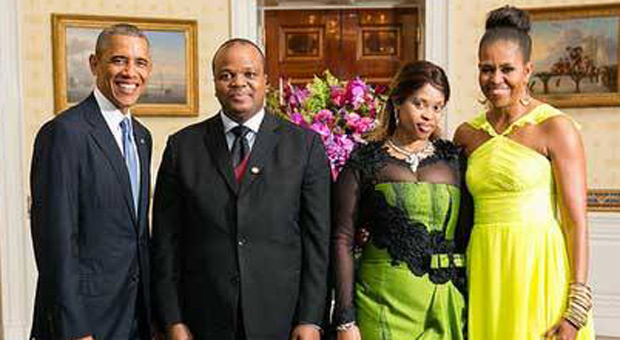Obama 'sides with dictators' at US-Africa summit
Trade topped the agenda and human rights were off the table as Barack Obama met with presidents, kings and dictators

A free daily email with the biggest news stories of the day – and the best features from TheWeek.com
You are now subscribed
Your newsletter sign-up was successful
The largest US-Africa summit comes to an end in Washington today amid criticism of Barack Obama for failing to address human rights abuses on the continent.
Heads of state from 45 African countries attended the summit, which focused on boosting trade and addressing security threats posed by extremist organisations, but activists accused the event's host of turning a blind eye towards war crimes, corruption and attacks on press freedom and gay rights.
The summit should have been used as an opportunity for Obama to "take the side of the African people and not of repressive leaders", Daniel Bekele, Africa director at Human Rights Watch said in a statement. "Trade, investment and improved global security, all key items on the summit's agenda, will only come about if human rights and the rule of law are respected."
The Week
Escape your echo chamber. Get the facts behind the news, plus analysis from multiple perspectives.

Sign up for The Week's Free Newsletters
From our morning news briefing to a weekly Good News Newsletter, get the best of The Week delivered directly to your inbox.
From our morning news briefing to a weekly Good News Newsletter, get the best of The Week delivered directly to your inbox.
The White House defended Obama by saying he regularly addresses issues surrounding human rights abuses and that preventing them was "a core moral responsibility of the United States".
As various presidents, kings and dictators prepare to fly home having secured valuable trade agreements, here are three criticisms levelled against the summit:
Dictators and alleged war criminals were on the guest list
Joseph Kabila, president of the Democratic Republic of Congo, was present despite calls for him to be uninvited due to allegations of widespread human rights abuses and war crimes.
A free daily email with the biggest news stories of the day – and the best features from TheWeek.com
"Try to find a human right that hasn't been trampled in Kabila's 13-year rule," writes Richard Miniter in Forbes. He has been linked to death squads and $15 billion worth of corruption, and he runs an army that the UN holds partly responsible for making the Congo the 'rape capital of the world'.
Kenyan president Uhuru Kenyatta and his deputy William Ruto are both on trial at the international criminal court for crimes against humanity, including murder, rape, forcible population transfer and persecution. The both deny the charges.
Attacks on press freedom went unmentioned
Attacks on journalists and media professionals are on the rise across the continent, according to reports by Reporters without Borders. Most recently, three Al Jazeera journalists were sentenced to seven years in Egypt for reporting on the banned Muslim Brotherhood.
In Swaziland, the last absolute monarchy in Africa, an editor and human rights lawyer were sentenced to two years in jail for criticising the judicial system a week before King Mswati III travelled to the summit. The lawyer Thulani Maseko has written a personal letter to President Obama from prison, asking for his help.
Anti-gay legislation was ignored
At least 37 out of 47 countries in mainland Africa have some form of criminal law against homosexual or transgender sexual activity, according to the International Lesbian, Gay, Bisexual, Trans and Intersex Association. Human rights groups called on the Obama administration to address the issue with these "anti-gay African strongmen" during the summit.
Activists have welcomed news that Uganda's infamous anti-gay laws have been dropped, but warned that the decision was made on "narrow grounds" and could easily be reversed.